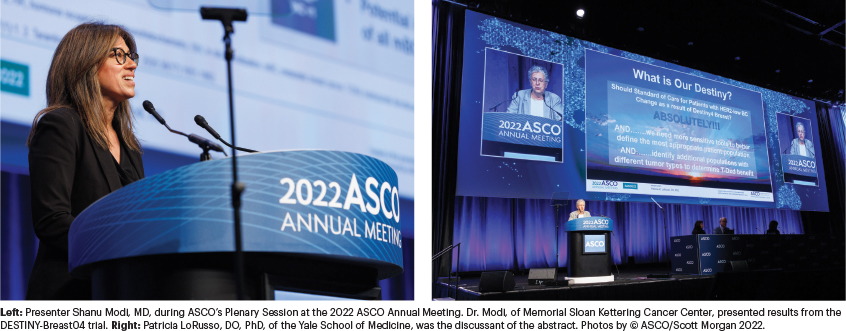The antibody-drug conjugate fam-trastuzumab deruxtecan-nxki (T-DXd) doubled progression-free survival compared with chemotherapy alone in patients with “HER2-low” metastatic breast cancer—ie, patients with low levels of HER2 expression. The agent also extended overall survival for patients with low levels of the HER2 receptor, regardless of hormone receptor status.1 These results could impact the way breast cancer is treated in about half of all breast cancers, for the first time incorporating patients with HER2-low disease as a subset that will benefit from a HER2-directed therapy such as T-DXd, experts predicted.

Shanu Modi, MD
The study, DESTINY-Breast04, was presented during the Plenary Session at the 2022 ASCO Annual Meeting by lead author Shanu Modi, MD, a medical oncologist at Memorial Sloan Kettering Cancer Center, New York, who received a standing ovation. Results were published in The New England Journal of Medicine to coincide with the presentation at the meeting.2
“DESTINY-Breast04 is the first phase III trial of a HER2-directed therapy in patients with [HER2-low] metastatic breast cancer to show a statistically significant and clinically meaningful benefit in progression-free survival and overall survival compared to standard-of-care treatment, regardless of hormone receptor status. The results of DESTINY-Breast04 are practice-changing. The efficacy of trastuzumab deruxtecan—[which] links trastuzumab, a HER2-directed monoclonal antibody, to deruxtecan, a topoisomerase I inhibitor that interrupts DNA replication in cancer cells—supports the use of HER2-low as a new therapeutically targetable category for metastatic breast cancer,” stated Dr. Modi.
“This new standard of care can improve survival for about 50% of all patients diagnosed with metastatic breast cancer today. These results mean that it is important for patients to know what level of HER2 their cancer expresses, not just whether it is HER2-positive or -negative, especially as HER2-low can be determined using commonly available tests,” she added.
“This trial’s findings show that trastuzumab deruxtecan doubles progression-free survival compared to chemotherapy alone in patients with hormone receptor–positive, HER2-low breast cancer. By effectively creating a new category of breast cancer—HER2-low—this trial will redefine how we classify breast cancer and will significantly expand the population of patients who can benefit from HER2-targeted therapy,” commented Jane Lowe Meisel, MD, an ASCO expert in breast cancers.

By effectively creating a new category of breast cancer—HER2-low—this trial … will significantly expand the population of patients who can benefit from HER2-targeted therapy.— Jane Lowe Meisel, MD
Tweet this quote
Trastuzumab, one component of the antibody-drug conjugate, is used to treat patients with breast cancer expressing high levels of HER2 (ie, HER2 3+ or HER2-positive) but not in those with low levels of HER2 expression (HER2 1+/2+ or HER2-low) or no HER2 expression (HER2 0+). T-DXd is approved in the United States for adults with unresectable or metastatic HER2-positive breast cancer who have been previously treated with prior anti-HER2–directed therapy, and the antibody-drug conjugate was recently granted Breakthrough Therapy designation for patients with HER2-low metastatic breast cancer.
Study Methodology
The randomized, double-blind, open-label, phase III DESTINY-Breast04 trial enrolled 557 patients in Asia, Europe, and North America with hormone receptor–negative or –positive metastatic breast cancer and centrally confirmed HER2-low expression. All patients had been previously treated with one or two prior lines of chemotherapy for metastatic breast cancer and were required to have endocrine therapy–refractory disease.
Patients were randomly assigned in a 2:1 ratio to receive either T-DXd at 5.4 mg/kg or physician’s choice of standard chemotherapy (capecitabine, eribulin, gemcitabine, paclitaxel, or nab-paclitaxel). The primary endpoint was progression-free survival in patients with hormone receptor–positive disease. Key secondary endpoints were progression-free survival in patients with either hormone receptor–positive or –negative disease, as well as overall survival in all patients and in those with hormone receptor–positive disease.
Testing with immunohistochemistry (IHC) showed that 58% of patients were IHC 1+ and 42% were IHC 2+. “At baseline, the visceral burden of disease was high and similar across the two treatment arms,” Dr. Modi said.
Key Findings
The median duration of treatment was 8.2 months with T-DXd and 3.5 months with physician’s choice of chemotherapy. At a median follow-up of 18.4 months, a 49% reduction in the risk of progressive cancer and a 36% reduction in the risk of death were observed in patients with hormone receptor–positive, HER2-low expression in those treated with T-DXd vs standard chemotherapy. Median progression-free survival was 10.1 months for the T-DXd–treated patients vs 5.4 months for those treated with standard chemotherapy (P < .0001). Among all 557 patients enrolled in the study, median progression-free survival was 9.9 months vs 5.1 months, respectively (P < .001).

In the patients with hormone receptor–positive disease, median overall survival was 23.9 months vs 17.8 months, respectively. Median overall survival in the total study population was 23.4 months for T-DXd recipients vs 16.8 months for standard chemotherapy recipients—a significant gain of 6.6 months in survival favoring the antibody-drug conjugate (P = .001).
In an exploratory analysis of the hormone receptor–negative subgroup, median progression-free survival was 8.5 months with T-DXd vs 2.9 months with standard therapy. Also, in this group, median overall survival was 18.2 months vs 8.3 months, respectively. “This is a poor-prognosis group,” Dr. Modi noted.
“We saw an unprecedented survival benefit in patients with hormone receptor–positive and hormone receptor–negative disease, regardless of IHC HER2 expression,” Dr. Modi stated. “We have been relegated to treating these patients as HER2-negative. That’s why these data are so significant. For the first time, we can extend HER2-targeted therapy to a broader range of patients.”
The rates of grade 3 or higher treatment-related adverse events were somewhat lower with T-DXd: 52.6% vs 67.4% with standard chemotherapy. However, higher rates of interstitial pneumonitis (of any grade) were reported in the T-DXd arm: 12.1% vs 0.1%, respectively.
Lung Toxicity Concern
“Lung toxicity is an important safety concern that will need to be closely monitored,” Dr. Modi said. During a press briefing, she elaborated on lung toxicity. “We want to be able to use this extremely compelling and efficacious therapy for our patients as safely as we can. I think from my perspective, the way we do that is to select the right patients and know how to manage interstitial lung disease. There are guidelines out there for clinicians, and there has been a massive education campaign about how to manage lung toxicity. I do believe it has had an impact,” she said.
“Now we have a heightened awareness and guidelines and tools at our disposal, and the two most recent studies in breast cancer show we have brought the high-grade event rate down through education. We should continue the campaign of awareness and giving clinicians the tools and the education they need to manage patients with lung toxicity appropriately,” she stated.
The next steps will be studies to explore the minimum threshold of HER2 expression that will respond to T-DXd.
Comment on Study

Julie R. Gralow, MD, FACP, FASCO
“T-DXd is approved in HER2-positive [overexpressing] breast cancer. This trial was conducted in a subset of tumors with low levels of HER2 expression, which comprises about half of all breast cancers previously labeled as HER2-negative,” explained Julie R. Gralow, MD, FACP, FASCO, Chief Medical Officer and Executive Vice-President of ASCO. “We have never before shown the benefit of HER2 therapies in this group of patients.”
“The doubling of progression-free survival in the HER2-low patients [treated with T-DXd], along with a 6-month gain in overall survival, will be practice-changing,” Dr. Gralow stated. “And this antibody-drug conjugate had lower rates of adverse events than standard-of-care chemotherapy.”
IHC Testing
Dr. Gralow added: “It will be important to do IHC testing and report 0, 1+, and 2+ findings. These results will change how we do pathology reports.”
Dr. Modi also expressed concern about the reliability of the IHC test currently used. “The IHC test is not the optimal test. Having said that, it is the most recognized test we have to identify HER2-low breast cancers today. Based on the DB04 trial, we have shown that we can use this test to identify patients with tumors that are IHC 1+ or 2+ (and not amplified for the gene). It’s what we have now and will allow us to bring these findings into the clinic immediately. In the future, we may have more sensitive and quantitative tests to use,” she told listeners.
DISCLOSURE: The study was funded by Daiichi Sankyo, Inc, and AstraZeneca. Dr. Modi has received honoraria from Daiichi Sankyo/Astra Zeneca and Seattle Genetics; has served as a consultant or advisor to AstraZeneca, Daiichi Sankyo, Genentech, GlaxoSmithKline, Lilly, MacroGenics, Puma Biotechnology, Seattle Genetics, and Zymeworks; and has received institutional research funding from AstraZeneca, Daiichi Sankyo, Roche/Genentech, and Seattle Genetics. Dr. Meisel has received honoraria from Medscape and Total Health Conferencing; has served as a consultant or advisor to AstraZeneca, Curio Science, Genentech, GlaxoSmithKline, Novartis, and Seattle Genetics; has received research funding from Pfizer and Seattle Genetics; and has been reimbursed for travel, accommodations, or other expenses from Pfizer, Puma Biotechnology, and Total Health Conferencing. Dr. Gralow has served as a consultant or advisor to Genentech, AstraZeneca, Roche, Novartis, and Seagen.
REFERENCES
1. Modi S, Jacot W, Yamashita T, et al: Trastuzumab deruxtecan (T-DXd) vs treatment of physician’s choice in patients with HER2-low unresectable and/or metastatic breast cancer: Results of DESTINY-Breast04, a randomized phase 3 study. 2022 ASCO Annual Meeting. Abstract LBA3. Presented June 5, 2022.
2. Modi S, Jacot W, Yamashita T, et al: Trastuzumab deruxtecan in previously treated HER2-low advanced breast cancer. N Engl J Med. June 5, 2022 (early release online).

